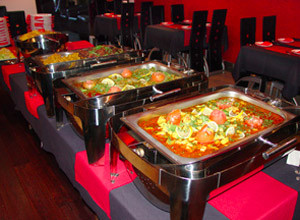In 2014 Dani and I visited Austin, Texas – the land of moon towers, SXSW, City Limits, beef BBQ, Wooderson & Randall ‘Pink’ Floyd and daytime drinking – and ate our way through the city.
We had breakfast tacos, a bloody mary garnished with a rib and sausage and about 9 meals at food trucks. With complex foods (other than the standard just reheating cooked meats) in a mobile kitchen comes complicated preparation and handling steps. Multiple raw ingredients need to be kept at the right temperature; operators have to avoid cross-contamination; clean and sanitize their equipment; and, keep bacteria and viruses off of their hands. All within the confines of a cart or trailer. It can be yummy, but making the meals safely is a tricky activity.
Multiple raw ingredients need to be kept at the right temperature; operators have to avoid cross-contamination; clean and sanitize their equipment; and, keep bacteria and viruses off of their hands. All within the confines of a cart or trailer. It can be yummy, but making the meals safely is a tricky activity.
KEYETV in Austin detailed the increasing challenge of regulating food safety at over 1000s mobile kitchens – and that many have inspection issues.
Austin can’t get its fill of food trucks. More than a thousand roving restaurants are wheeling around the city, and the latest reports from Austin/Travis Co. Health and Human Services show 15 to 20 percent of them are failing their inspections.
“We have events every single weekend,” said Environmental Health Supervisor Marcel Elizondo.
Elizondo says inspectors have one goal. “Looking out for food safety,” said Elizondo. “To help keep them on the straight and narrow.”
During two weeks in March inspectors drove around Austin checking 97 food trucks. 15 were shut down for health violations and reopened after fixing the problems listed on the food inspection report.
Inspectors also keep an eye on temporary food booths. Last year, during SXSW, 318 inspections uncovered a few vendors operating without permits. The biggest problem was having no way for workers to properly wash their hands. This year inspectors found the same problems at an East Austin food trailer court.
“He didn’t have any kind of proper hand wash set up, which is basically a water jug with an open tap on it where he can wash both hands at the same time,” said Harris.
Greg Parish runs the gourmet popcorn booth and blames bad timing.
“We have it set up. It’s just that, we were just in the middle of setting it up and I just hadn’t pulled it out,” said Parish. “Going to go get this done and get ready to get started.”
“I think the biggest challenge is the temperature thing,” said Chef Charlotte Gordon with Pink Avocado Catering. “Making things like ice chests work and keeping them filled and keeping everything nice and cold.”
10 years ago Austin only had one inspector keeping tabs on the city’s mobile restaurants. In 2016 there are six.










